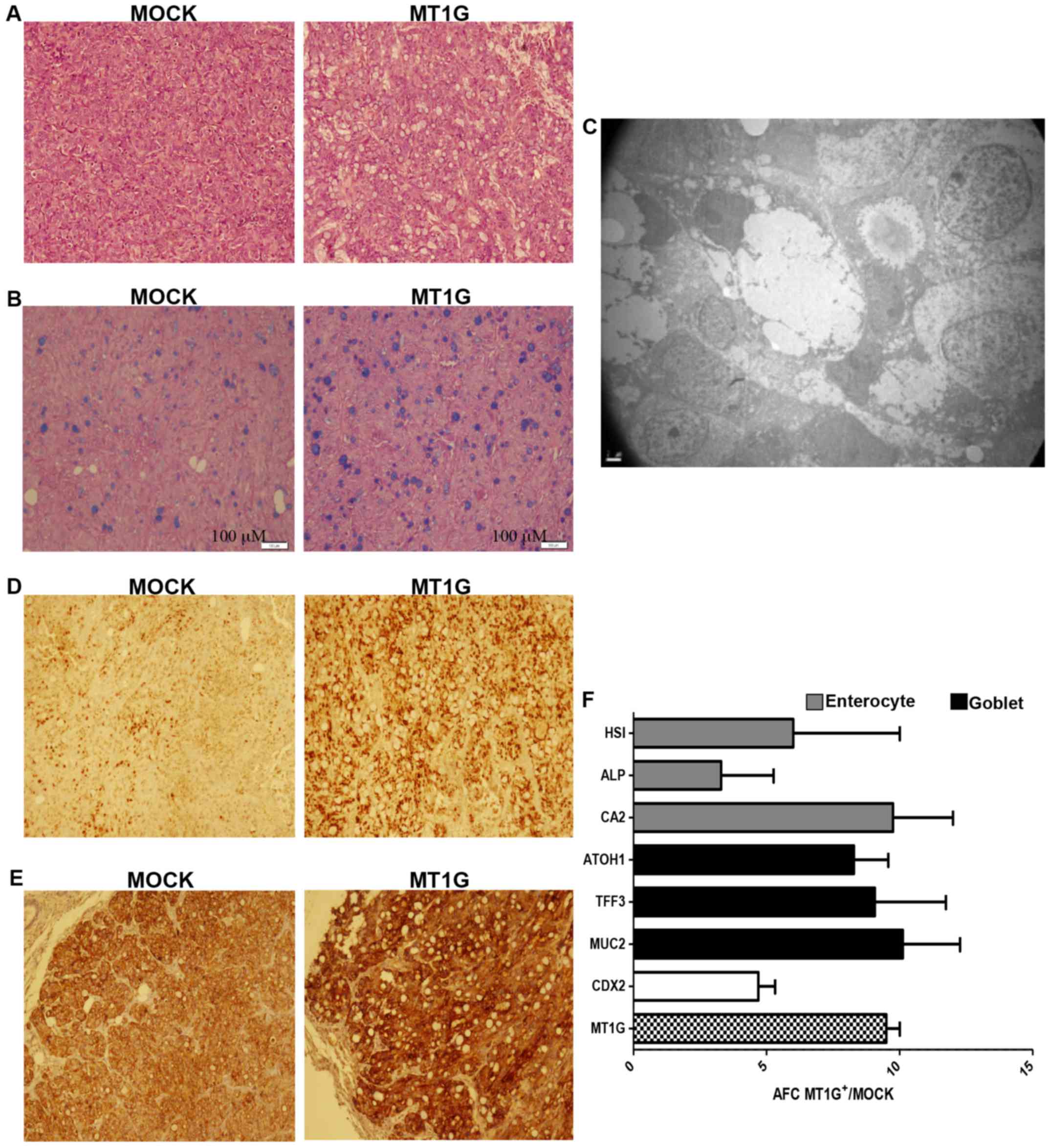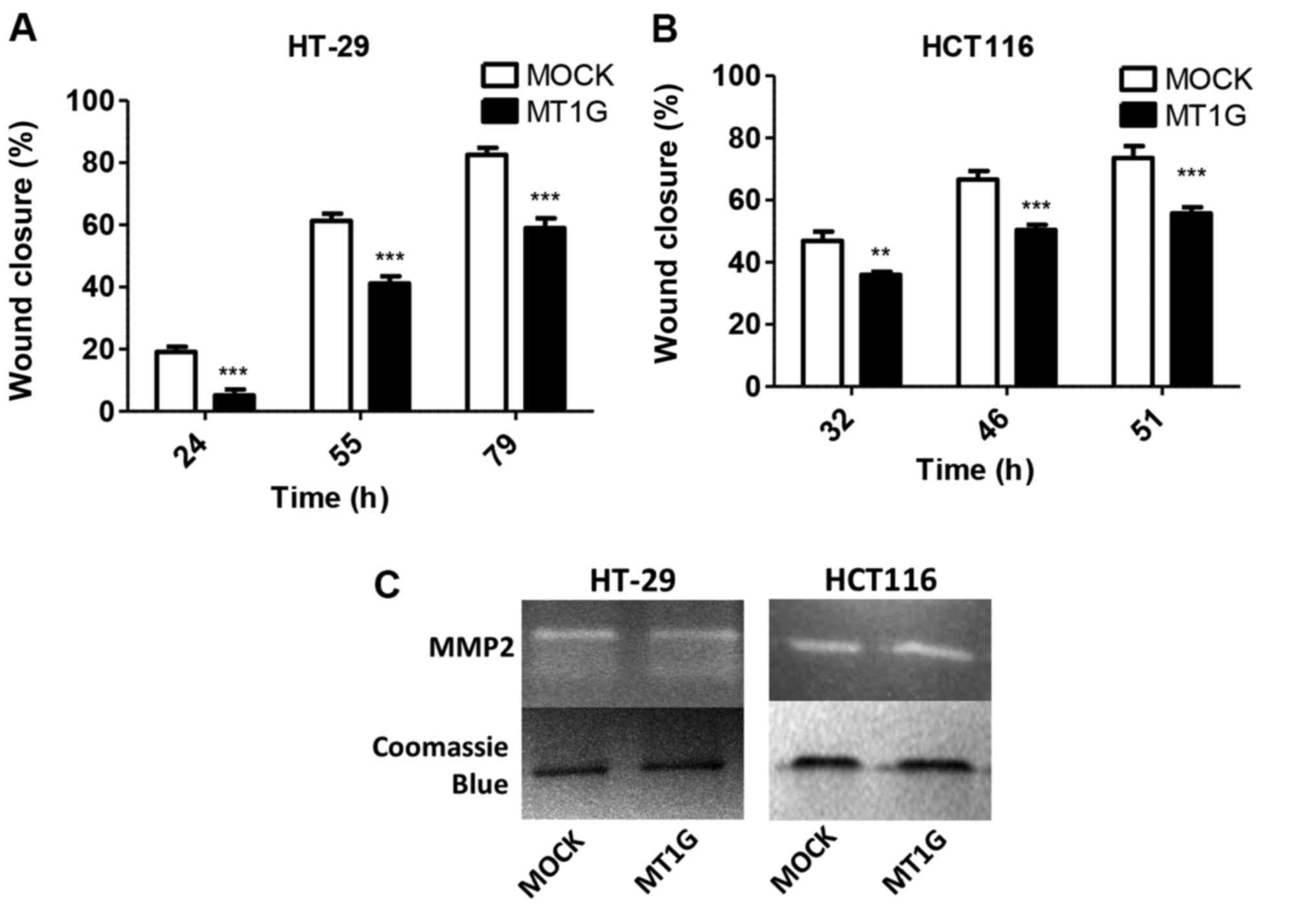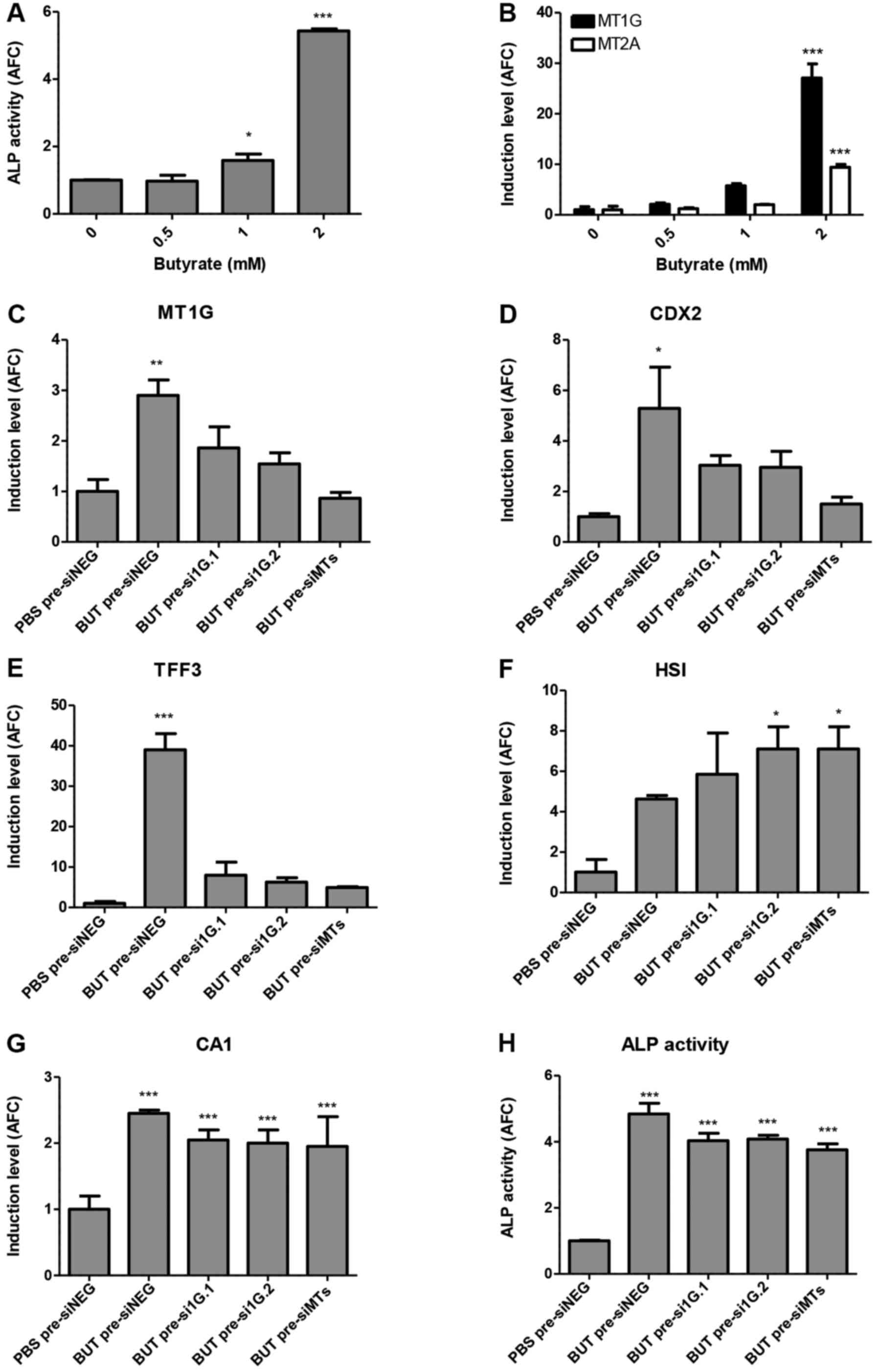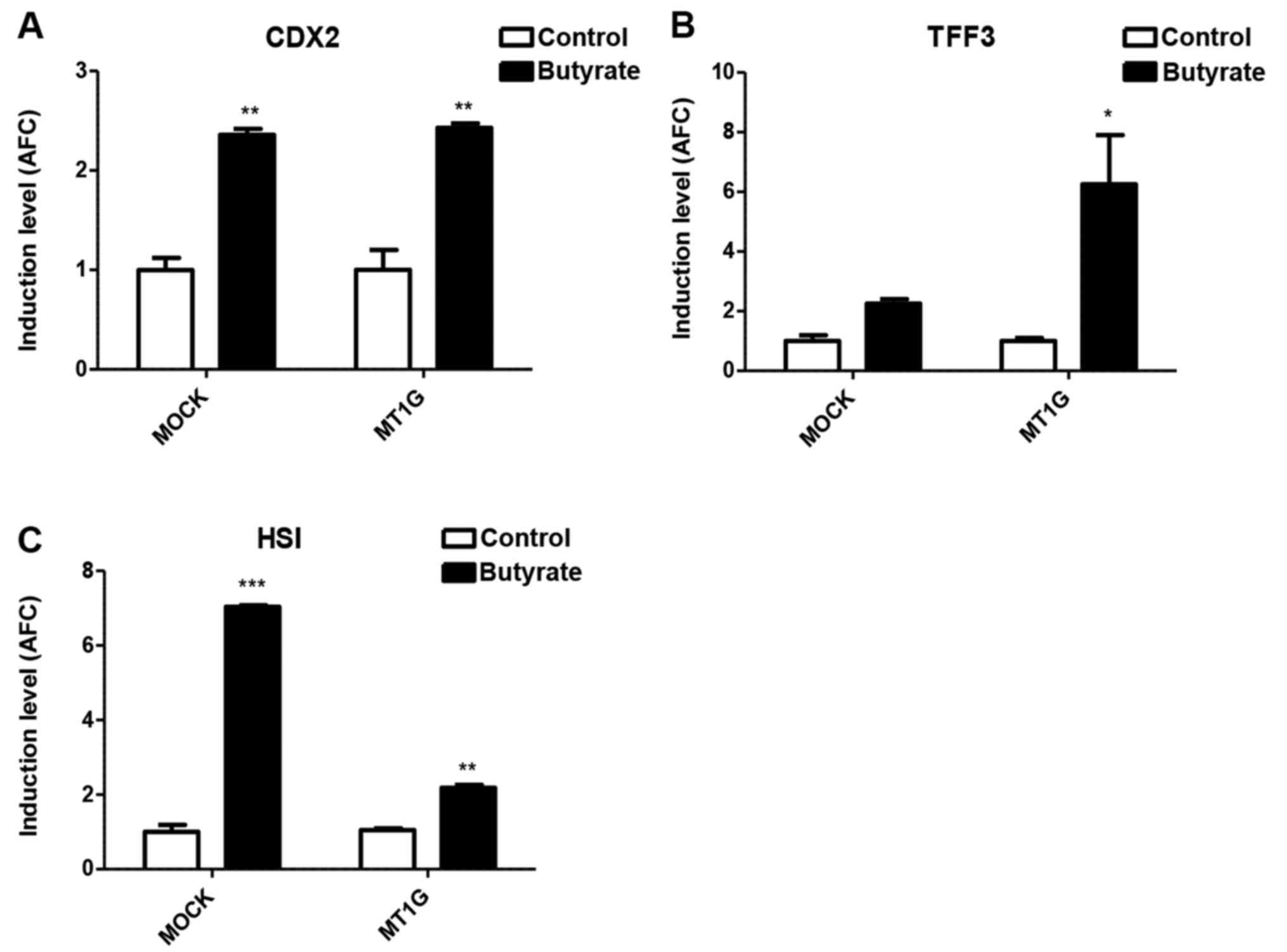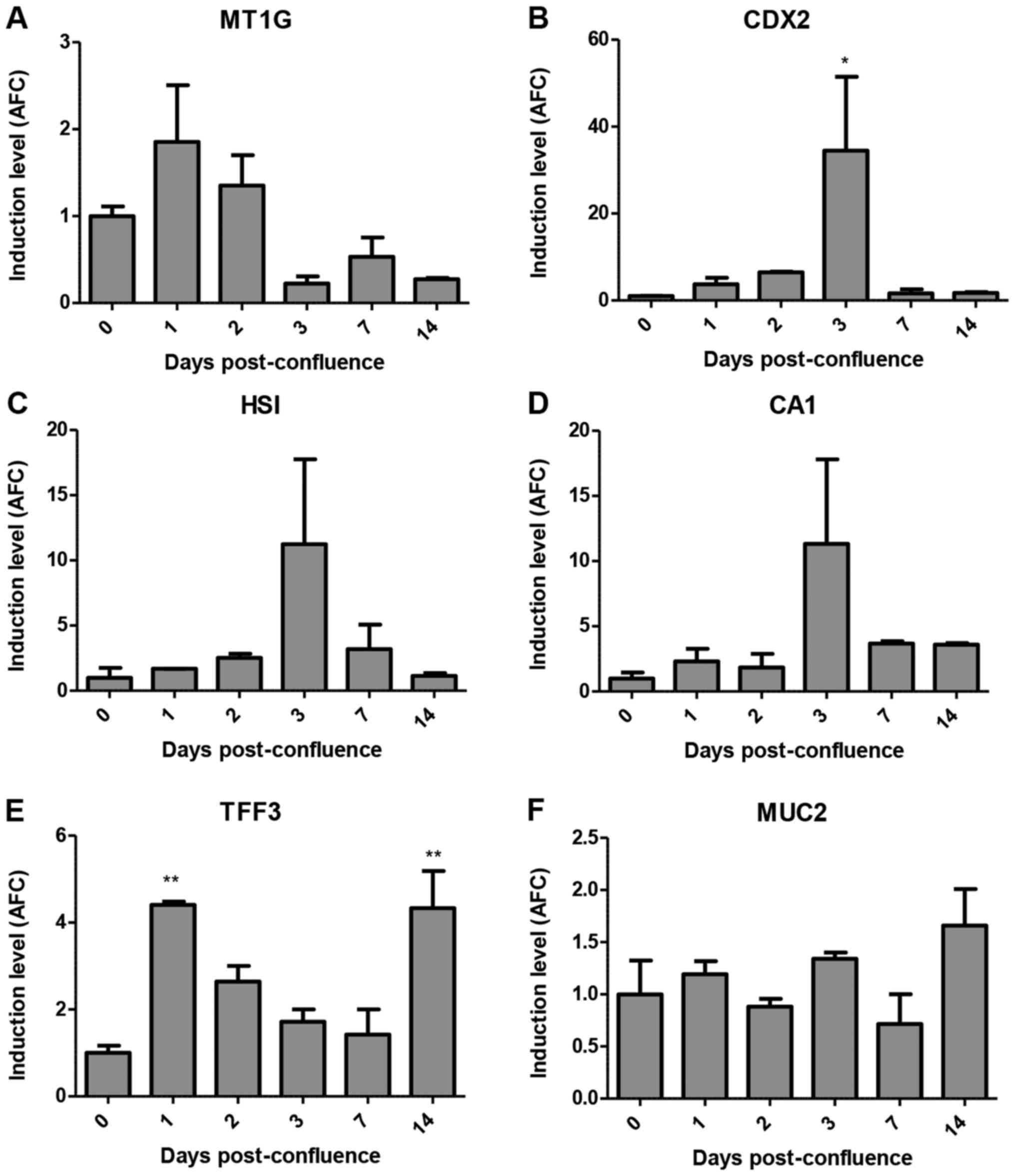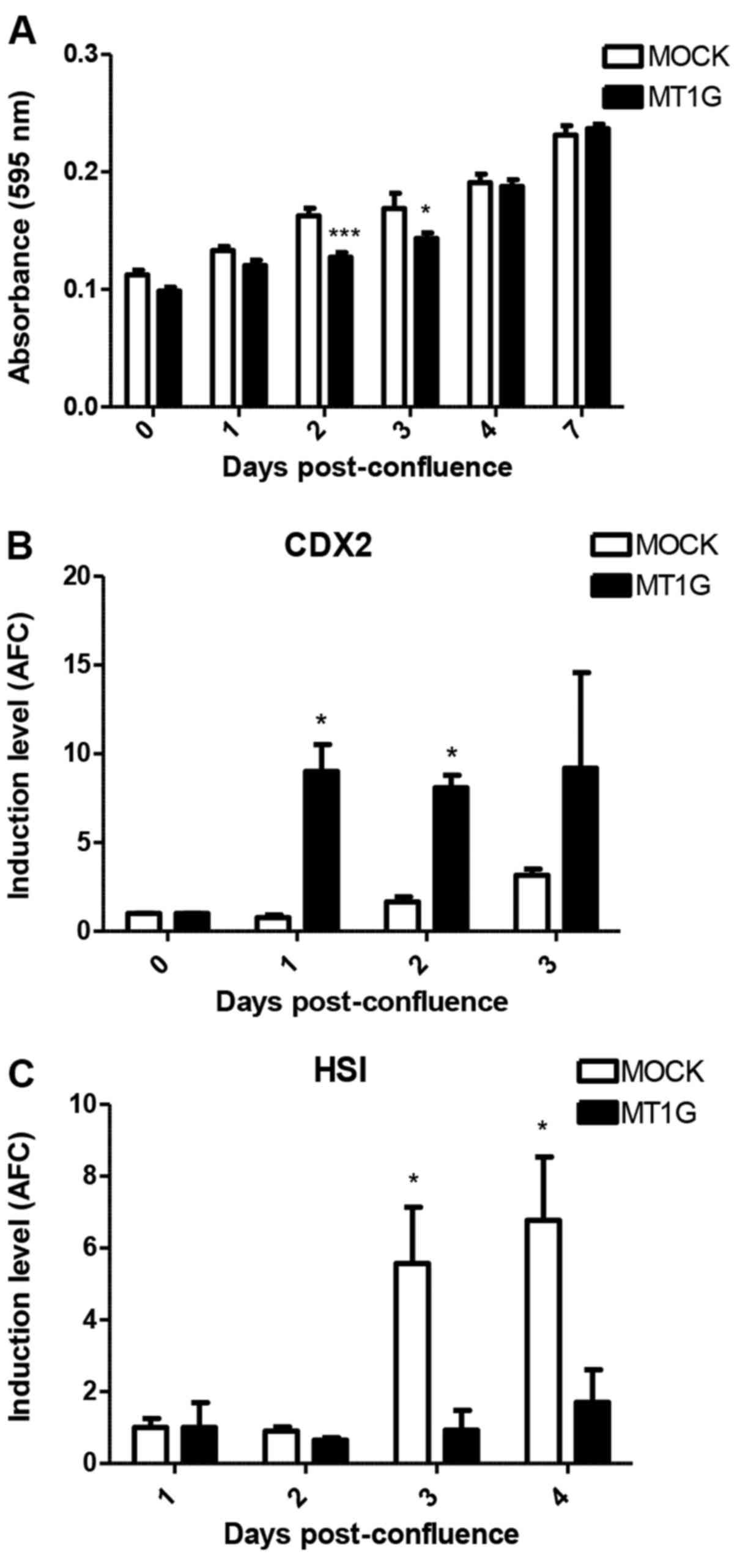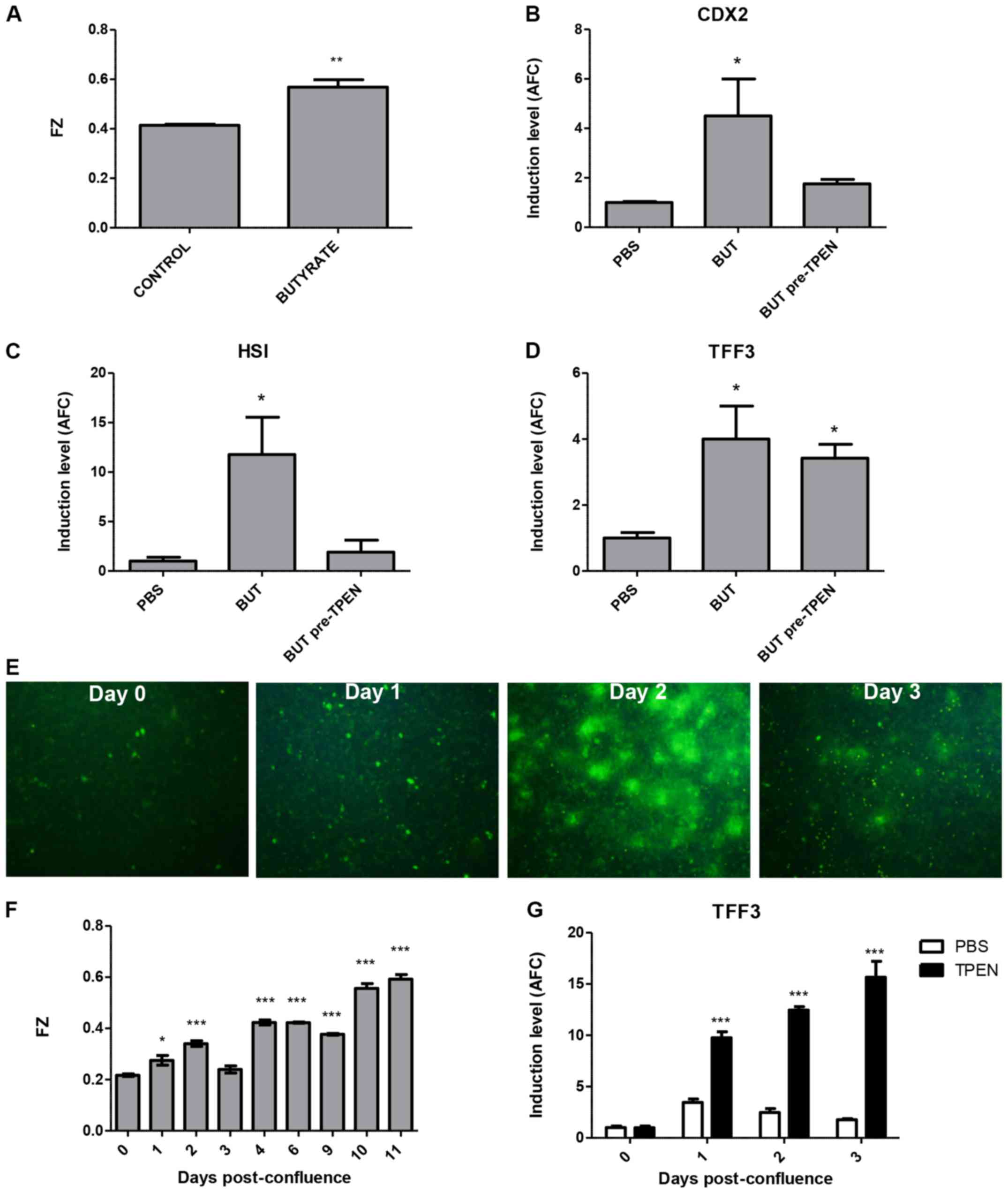|
1
|
Torre LA, Bray F, Siegel RL, Ferlay J,
Lortet-Tieulent J and Jemal A: Global cancer statistics, 2012. CA
Cancer J Clin. 65:87–108. 2015. View Article : Google Scholar : PubMed/NCBI
|
|
2
|
Dalerba P, Kalisky T, Sahoo D, Rajendran
PS, Rothenberg ME, Leyrat AA, Sim S, Okamoto J, Johnston DM, Qian
D, et al: Single-cell dissection of transcriptional heterogeneity
in human colon tumors. Nat Biotechnol. 29:1120–1127. 2011.
View Article : Google Scholar : PubMed/NCBI
|
|
3
|
Sadanandam A, Lyssiotis CA, Homicsko K,
Collisson EA, Gibb WJ, Wullschleger S, Ostos LC, Lannon WA,
Grotzinger C, Del Rio M, et al: A colorectal cancer classification
system that associates cellular phenotype and responses to therapy.
Nat Med. 19:619–625. 2013. View
Article : Google Scholar : PubMed/NCBI
|
|
4
|
Pedersen MO, Larsen A, Stoltenberg M and
Penkowa M: The role of metallothionein in oncogenesis and cancer
prognosis. Prog Histochem Cytochem. 44:29–64. 2009. View Article : Google Scholar : PubMed/NCBI
|
|
5
|
Eckschlager T, Adam V, Hrabeta J, Figova K
and Kizek R: Metallothioneins and cancer. Curr Protein Pept Sci.
10:360–375. 2009. View Article : Google Scholar : PubMed/NCBI
|
|
6
|
Dziegiel P, Pula B, Kobierzycki C,
Stasiolek M and Podhorska-Okolow M: Metallothioneins in normal and
cancer cells. Adv Anat Embryol Cell Biol. 218:1–117. 2016.
View Article : Google Scholar : PubMed/NCBI
|
|
7
|
Gumulec J, Raudenska M, Adam V, Kizek R
and Masarik M: Metallothionein - immunohistochemical cancer
biomarker: A meta-analysis. PLoS One. 9:e853462014. View Article : Google Scholar : PubMed/NCBI
|
|
8
|
Arriaga JM, Levy EM, Bravo AI, Bayo SM,
Amat M, Aris M, Hannois A, Bruno L, Roberti MP, Loria FS, et al:
Metallothionein expression in colorectal cancer: Relevance of
different isoforms for tumor progression and patient survival. Hum
Pathol. 43:197–208. 2012. View Article : Google Scholar : PubMed/NCBI
|
|
9
|
Arriaga JM, Bravo IA, Bruno L, Bayo
Morales S, Hannois A, Sanchez Loria F, Pairola F, Huertas E,
Roberti MP, Rocca YS, et al: Combined metallothioneins and p53
proteins expression as a prognostic marker in patients with Dukes
stage B and C colorectal cancer. Hum Pathol. 43:1695–1703. 2012.
View Article : Google Scholar : PubMed/NCBI
|
|
10
|
Janssen AM, van Duijn W, Oostendorp-Van De
Ruit MM, Kruidenier L, Bosman CB, Griffioen G, Lamers CB, van
Krieken JH, van De Velde CJ and Verspaget HW: Metallothionein in
human gastrointestinal cancer. J Pathol. 192:293–300. 2000.
View Article : Google Scholar : PubMed/NCBI
|
|
11
|
Bianchini M, Levy E, Zucchini C, Pinski V,
Macagno C, De Sanctis P, Valvassori L, Carinci P and Mordoh J:
Comparative study of gene expression by cDNA microarray in human
colorectal cancer tissues and normal mucosa. Int J Oncol. 29:83–94.
2006.PubMed/NCBI
|
|
12
|
Arriaga JM, Greco A, Mordoh J and
Bianchini M: Metallothionein 1G and zinc sensitize human colorectal
cancer cells to chemotherapy. Mol Cancer Ther. 13:1369–1381. 2014.
View Article : Google Scholar : PubMed/NCBI
|
|
13
|
Cleveland WS, Devlin SJ and Grosse E:
Regression by local fitting: Methods, properties, and computational
algorithm. J Econom. 37:87–114. 1988. View Article : Google Scholar
|
|
14
|
Yang YH, Dudoit S, Luu P, Lin DM, Peng V,
Ngai J and Speed TP: Normalization for cDNA microarray data: A
robust composite method addressing single and multiple slide
systematic variation. Nucleic Acids Res. 30:e152002. View Article : Google Scholar : PubMed/NCBI
|
|
15
|
Dennis G Jr, Sherman BT, Hosack DA, Yang
J, Gao W, Lane HC and Lempicki RA: DAVID: Database for Annotation,
Visualization, and Integrated Discovery. Genome Biol. 4:32003.
View Article : Google Scholar
|
|
16
|
Huang W, Sherman BT and Lempicki RA:
Systematic and integrative analysis of large gene lists using DAVID
bioinformatics resources. Nat Protoc. 4:44–57. 2009. View Article : Google Scholar : PubMed/NCBI
|
|
17
|
Velcich A, Palumbo L, Jarry A, Laboisse C,
Racevskis J and Augenlicht L: Patterns of expression of
lineage-specific markers during the in vitro-induced
differentiation of HT29 colon carcinoma cells. Cell Growth Differ.
6:749–757. 1995.PubMed/NCBI
|
|
18
|
Troeberg L and Nagase H: Zymography of
metalloproteinases. Curr Protoc Protein Sci. 21:Unit 21.15.
2004.
|
|
19
|
Augeron C and Laboisse CL: Emergence of
permanently differentiated cell clones in a human colonic cancer
cell line in culture after treatment with sodium butyrate. Cancer
Res. 44:3961–3969. 1984.PubMed/NCBI
|
|
20
|
Zweibaum A, Pinto M, Chevalier G, Dussaulx
E, Triadou N, Lacroix B, Haffen K, Brun JL and Rousset M:
Enterocytic differentiation of a subpopulation of the human colon
tumor cell line HT-29 selected for growth in sugar-free medium and
its inhibition by glucose. J Cell Physiol. 122:21–29. 1985.
View Article : Google Scholar : PubMed/NCBI
|
|
21
|
Chung YS, Song IS, Erickson RH, Sleisenger
MH and Kim YS: Effect of growth and sodium butyrate on brush border
membrane-associated hydrolases in human colorectal cancer cell
lines. Cancer Res. 45:2976–2982. 1985.PubMed/NCBI
|
|
22
|
VanDussen KL, Carulli AJ, Keeley TM, Patel
SR, Puthoff BJ, Magness ST, Tran IT, Maillard I, Siebel C, Kolterud
Å, et al: Notch signaling modulates proliferation and
differentiation of intestinal crypt base columnar stem cells.
Development. 139:488–497. 2012. View Article : Google Scholar : PubMed/NCBI
|
|
23
|
Barker N, Ridgway RA, van Es JH, van de
Wetering M, Begthel H, van den Born M, Danenberg E, Clarke AR,
Sansom OJ and Clevers H: Crypt stem cells as the cells-of-origin of
intestinal cancer. Nature. 457:608–611. 2009. View Article : Google Scholar : PubMed/NCBI
|
|
24
|
Takeda N, Jain R, LeBoeuf MR, Wang Q, Lu
MM and Epstein JA: Interconversion between intestinal stem cell
populations in distinct niches. Science. 334:1420–1424. 2011.
View Article : Google Scholar : PubMed/NCBI
|
|
25
|
Vecchini F, Pringault E, Billiar TR,
Geller DA, Hausel P and Felley-Bosco E: Decreased activity of
inducible nitric oxide synthase type 2 and modulation of the
expression of glutathione S-transferase α, bcl-2, and
metallothioneins during the differentiation of CaCo-2 cells. Cell
Growth Differ. 8:261–268. 1997.PubMed/NCBI
|
|
26
|
Hecht D, Jung D, Prabhu VV, Munson PJ,
Hoffman MP and Kleinman HK: Metallothionein promotes
laminin-1-induced acinar differentiation in vitro and reduces tumor
growth in vivo. Cancer Res. 62:5370–5374. 2002.PubMed/NCBI
|
|
27
|
Bagheri Maghdooni P, Govaerts I and De Ley
M: Role of metallothionein in differentiation of leukemia cells.
Mol Biol Rep. 38:3017–3022. 2011. View Article : Google Scholar : PubMed/NCBI
|
|
28
|
Nishikawa M, Mori H and Hara M: Reduced
zinc cytotoxicity following differentiation of neural
stem/progenitor cells into neurons and glial cells is associated
with upregulation of metallothioneins. Environ Toxicol Pharmacol.
39:1170–1176. 2015. View Article : Google Scholar : PubMed/NCBI
|
|
29
|
Wu C, Pot C, Apetoh L, Thalhamer T, Zhu B,
Murugaiyan G, Xiao S, Lee Y, Rangachari M, Yosef N, et al:
Metallothioneins negatively regulate IL-27-induced type 1
regulatory T cell differentiation. Proc Natl Acad Sci USA.
110:7802–7807. 2013. View Article : Google Scholar : PubMed/NCBI
|
|
30
|
Murakami M and Hirano T: Intracellular
zinc homeostasis and zinc signaling. Cancer Sci. 99:1515–1522.
2008. View Article : Google Scholar : PubMed/NCBI
|
|
31
|
Yamasaki S, Sakata-Sogawa K, Hasegawa A,
Suzuki T, Kabu K, Sato E, Kurosaki T, Yamashita S, Tokunaga M,
Nishida K, et al: Zinc is a novel intracellular second messenger. J
Cell Biol. 177:637–645. 2007. View Article : Google Scholar : PubMed/NCBI
|
|
32
|
Beyersmann D and Haase H: Functions of
zinc in signaling, proliferation and differentiation of mammalian
cells. Biometals. 14:331–341. 2001. View Article : Google Scholar : PubMed/NCBI
|
|
33
|
Dubben S, Hönscheid A, Winkler K, Rink L
and Haase H: Cellular zinc homeostasis is a regulator in monocyte
differentiation of HL-60 cells by 1 alpha,25-dihydroxyvitamin D3. J
Leukoc Biol. 87:833–844. 2010. View Article : Google Scholar : PubMed/NCBI
|
|
34
|
Wolford JL, Chishti Y, Jin Q, Ward J, Chen
L, Vogt S and Finney L: Loss of pluripotency in human embryonic
stem cells directly correlates with an increase in nuclear zinc.
PLoS One. 5:e123082010. View Article : Google Scholar : PubMed/NCBI
|
|
35
|
Maret W: Metals on the move: Zinc ions in
cellular regulation and in the coordination dynamics of zinc
proteins. Biometals. 24:411–418. 2011. View Article : Google Scholar : PubMed/NCBI
|
|
36
|
Kindermann B, Döring F, Pfaffl M and
Daniel H: Identification of genes responsive to intracellular zinc
depletion in the human colon adenocarcinoma cell line HT-29. J
Nutr. 134:57–62. 2004.PubMed/NCBI
|
|
37
|
Krezel A and Maret W: Zinc-buffering
capacity of a eukaryotic cell at physiological pZn. J Biol Inorg
Chem. 11:1049–1062. 2006. View Article : Google Scholar : PubMed/NCBI
|
|
38
|
Schmidt C and Beyersmann D: Transient
peaks in zinc and metallothionein levels during differentiation of
3T3L1 cells. Arch Biochem Biophys. 364:91–98. 1999. View Article : Google Scholar : PubMed/NCBI
|
|
39
|
Apostolova MD, Ivanova IA and Cherian MG:
Metallothionein and apoptosis during differentiation of myoblasts
to myotubes: Protection against free radical toxicity. Toxicol Appl
Pharmacol. 159:175–184. 1999. View Article : Google Scholar : PubMed/NCBI
|















